The Minister of Justice does not have the authority to evaluate the Constitutional Court`s decisions - Maryna Stavniychuk
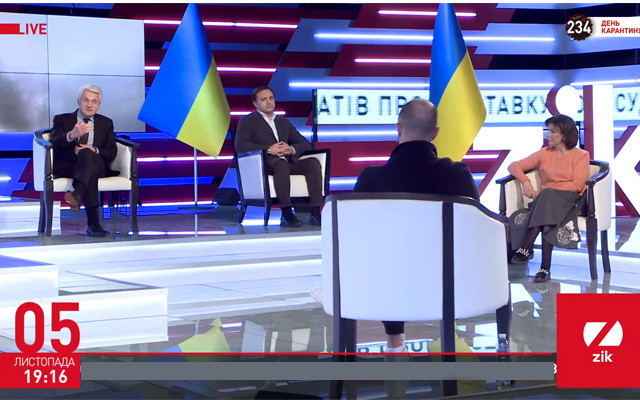
The artificiality of the constitutional crisis was provoked by the Ukrainian authorities, not by the Constitutional Court itself.
Maryna Stavniychuk, the Head of the Rule of Law Committee at the UNBA, is convinced of this. On the air of the talk show "People Against" with Natalia Vlashchenko, Maryna Stavniychuk stressed once again that all compromises in overcoming this constitutional crisis should be found solely within and on the basis of the Constitution and laws of Ukraine.
According to the Head of the Rule of Law Committee at the UNBA, the solution to the constitutional crisis should not be dealt with by the political team that created it due to incompetence or because of influences from third parties.
During the broadcast, she reminded the Minister of Justice, Denys Maluska, that he had no authority to interfere in the activities of the Constitutional Court of Ukraine or comment on its decision.
"Does the Minister of Justice have the authority to evaluate the legality or illegality of decisions made by the Constitutional Court or to doubt the authority of the judges of the Constitutional Court? There is no such. Moreover, the Ministry of Justice is responsible for enforcing court verdicts and other Ukrainian courts` decisions, even coercive ones. You forgot about this. If you are a minister that works according to Article 19 of the Constitution of Ukraine, it is not your role to evaluate the decision of the Constitutional Court. You can take the floor at a meeting of the National Security and Defense Council and tell the President, you can sign the relevant decree within your powers, but now you are publicly trampling on the Constitution. Your actions now do not correspond to your powers." - Stavniychuk told Malyuska.
Maryna Stavniychuk stipulates that the way out of the constitutional crisis may be by conducting a full analysis of the entire anti-corruption system of the state and bringing it into line with the Constitution.
"To save Ukraine in this difficult international situation, we all need to understand - the law is bad, but it must be obeyed. Even the one does not like the decision of the Constitutional Court of Ukraine, and it is also not impeccable for me, but I understand that it is final and enforceable. But if there is another position in the parliament - they can get together and decide. You are aware that the anti-corruption legislation, including the legislation on the e-declaration system in the state, violates human rights in many respects, it does not comply with the principle of the rule of law. We need to analyze this whole system and see: if we monitor the lifestyle of civil servants, it should be a procedure defined by law. It should not be a clerk from the National Agency for Prevention of Corruption, who will open the door to a judge of the Constitutional Court of Ukraine or someone else each time” - said Maryna Stavniychuk.
We want to recall that on October 27, 2020, the Constitutional Court of Ukraine ruled on the constitutional petition of 47 people's deputies of Ukraine regarding the constitutionality of certain provisions of the Law "On Prevention of Corruption" and the Criminal Code of Ukraine. In particular, Article 366-1 of the Criminal Code of Ukraine, which provides for liability for false declarations, was declared unconstitutional. The decision has provoked a strong wave of public criticism and speculation, and some experts see it as the beginning of a constitutional crisis. The UNBA has made a statement concerning its position.
Popular news

Self-government
UNBA program for implementation of the Roadmap on the rule of law published
In order to ensure the implementation of measures set out in the Roadmap on the Rule of Law, the Bar Council of Ukraine approved a program for its implementation in relation to the reform of advocacy.
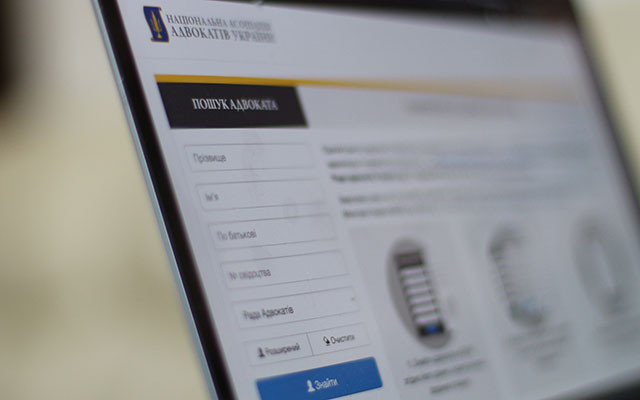
URAU
Access to advocate contacts in URAU has been restored
The Bar Council of Ukraine has opened up public access to data from the Unified Register of Advocates of Ukraine, which was closed at the start of the full-scale invasion in 2022. The decision was made at a meeting on December 12–13.
Self-government
Members of the QDCB are not required to submit declarations - BCU
Bar Council of Ukraine examined the legal status of members of bar self-government bodies and found that they are not required to submit declarations of persons authorized to perform functions of state or local self-government.
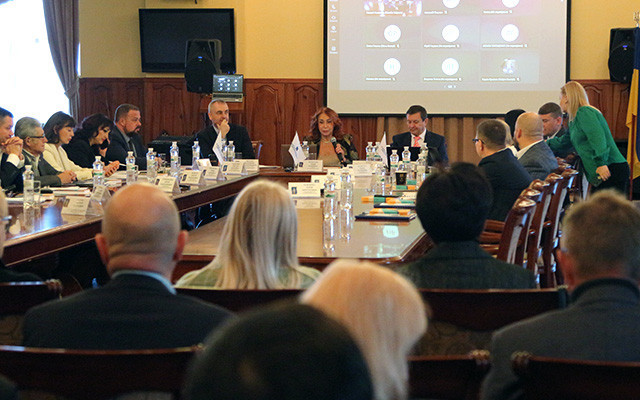
Self-government
BCU has identified 12 areas for implementing the Roadmap for advocacy
During its meeting on December 12, the Bar Council of Ukraine considered the Roadmap on the Rule of Law, approved by Order of the Cabinet of Ministers of Ukraine No. 475-r dated May 14, 2025. The document provides for the development and adoption of a draft law on improving the legal regulation of advocacy by the fourth quarter of 2026.

Guarantees of the practice of law
The Ombudsman acknowledged the problem of violation of the human right to legal aid in the TCC
The Verkhovna Rada Commissioner for human rights Dmytro Lubinets confirmed the existence of a problem with ensuring the constitutional right to professional legal assistance in territorial recruitment and social support centers.

Guarantees of the practice of law
The agreement on the provision of legal assistance is not public – BCU
Bar Council of Ukraine in its decision No. 111 dated October 18, 2025, responded to questions regarding the possibility of concluding legal assistance agreements by accepting a public offer, using an electronic form of the agreement, and posting information about legal assistance on websites.
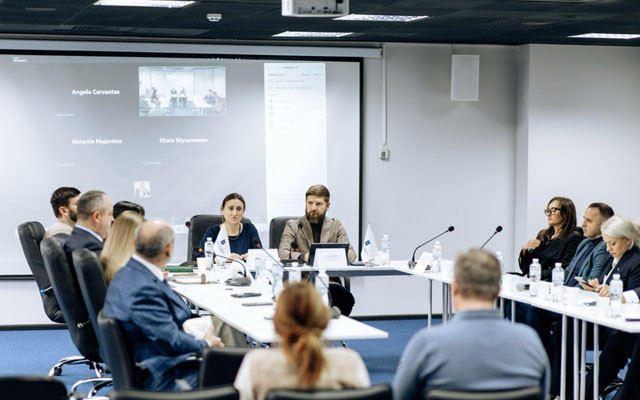
Discussion
Why preventive measures have turned into preventive punishment in Ukraine: round table discussion
The European approach, enshrined in the CPC, provides for detention as an exceptional preventive measure: courts must prove the impossibility of milder alternatives and carefully assess the risks. In practice, however, it is increasingly being applied almost automatically, eroding standards of freedom.
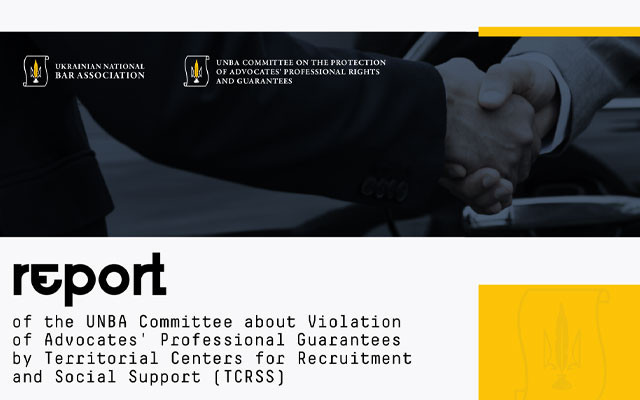
Guarantees of the practice of law
The UNBA presented a report on violations of advocates' rights in the TCC
The Committee for the protection of advocate's rights and guarantees of legal practice of the UNBA has prepared a consolidated report on violations of advocate's professional rights and guarantees of legal practice by territorial recruitment and social support centers for the period from 2022 to the first half of 2025.
Publications

Censor.net Protecting advocates – protecting justice: addressing concerns about the new law

Ihor Kolesnykov A BRIEF SUMMARY REGARDING THE APPLICATION OF THE ORDER ON EXTENDED CONFISCATION IN LATVIA REGARDING FINANCIAL ASSETS OF…

Valentyn Gvozdiy WORKING IN A WAR ZONE

Lydia Izovitova Formula of perfection

Sergiy Vylkov Our judicial system is so built that courts do not trust advocates

Iryna Vasylyk Advocacy in the proclamation of Independence of Ukraine

Oleksandr DULSKY When we cross the border of the Supreme Anti-Corruption Court, we get into another department of the National Anti-Corruption…

Vadym Krasnyk The UNBA will work, and all obstacles and restrictions are only temporary inconveniences
